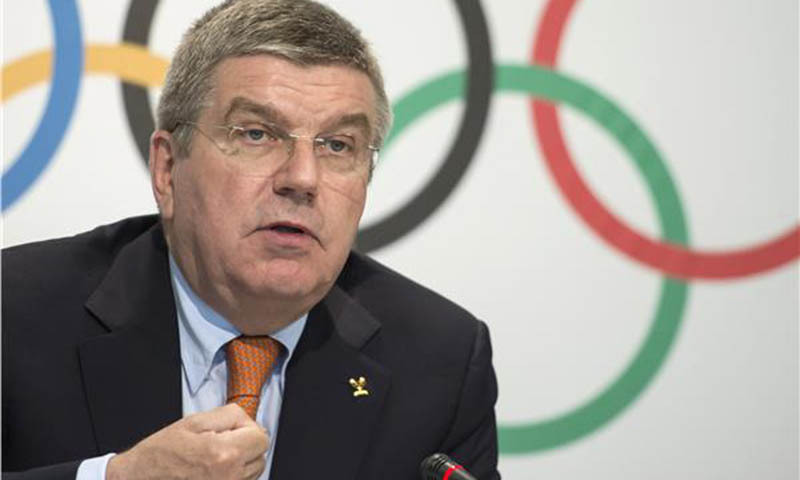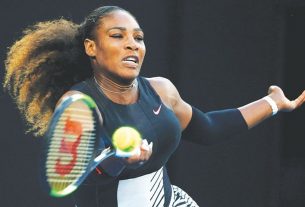TOKYO: Olympics chief Thomas Bach agreed that 2021 was the ‘last option’ for holding the delayed Tokyo Games on Thursday, stressing that postponement cannot go on forever.
Bach said he backed Japan’s stance that the Games will have to be cancelled if the coronavirus pandemic isn’t under control by next year.
In March, the Tokyo 2020 Olympics were postponed to July 23, 2021 over the coronavirus, which has killed hundreds of thousands around the world and halted international sport and travel.
“Quite frankly, I have some understanding for [Japan’s position] because you cannot forever employ 3,000, or 5,000, people in an organising committee,” Bach, president of the International Olympic Committee (IOC), told the BBC. “You cannot every year change the entire sports schedule worldwide for all the major federations.
“You cannot have the athletes being in uncertainty, you cannot have so much overlapping with a future Olympic Games.”
The IOC leader said it was a ‘mammoth task’ to reorganise the Olympics, which have never been cancelled outside of the world wars.
However, Japanese officials have been clear that they have no intention of postponing the Games again beyond next year.
Bach warned that ‘nobody knows’ how the situation will play out, but said the IOC will act on advice from the World Health Organization.
“We have established one principle, and this is to organise these Games in a safe environment for all the participants,” he said. “Nobody knows what the world will look like in one year and two months from today, so we have to rely on [the experts].”
Bach wouldn’t say whether a vaccine was a prerequisite for going ahead with the Olympics, but was lukewarm on the idea of holding them without fans.
“This is not what we want,” he said. “Because the Olympic spirit is about also uniting the fans and this is what makes the Games so unique that they’re in an Olympic stadium, all the fans from all over the world are together.
“But when it then would come to the decision… I would ask you to give me some more time for consultation with the athletes, with the World Health Organisation, with the Japanese partners.”
The IOC has already set aside $800 million to help organisers and sports federations meet the extra costs of a postponed Olympics.
According to the latest budget, the Games were due to cost $12.6 billion, shared between the organising committee, the government of Japan and Tokyo city.
But Bach said there should be ‘no taboo’ in cutting costs for next year’s Games.
“They will definitely be different, and they have to be different,” he said. “If we all have learned something during this crisis, [it is] to look to the essentials and not so much on the nice-to-have things.
“So this concentration on the essentials should be reflected in the organisation of these Games… there should be no taboo.”
Meanwhile, a satirical mock-up depicting the Tokyo Games logo as the new coronavirus has been pulled after Olympic organisers branded it ‘insensitive’ and said it infringed copyright.
The design combines the distinctive, spiky image of the coronavirus cell with the blue-and-white Tokyo 2020 logo, and appeared on the front page of an in-house magazine published by the Foreign Correspondents’ Club of Japan (FCCJ).
FCCJ president Khaldon Azhari said on Thursday the club had decided to withdraw the image and remove it from its website after advice that its legal defence against a potential copyright breach was ‘not strong’.
“More importantly, we are all in this coronavirus crisis together and clearly the cover offended some people in our host country Japan,” said Azhari, voicing ‘sincere regret’.
Tokyo 2020 chief executive Toshiro Muto hailed the move, telling reporters: “We believe their response was appropriate and this is what we were hoping for as an outcome.”
Speaking to reporters on Monday, Tokyo 2020’s chief spokesman Masa Takaya had blasted the emblem as ‘very disappointing’.
He said it was also an infringement of the copyright owned by Tokyo 2020, and revealed that top Olympic bosses had requested that the FCCJ remove the image.
“I also have to say this is insensitive to many people being affected by this damaging and painful situation,” said Takaya. “It is especially insensitive to athletes who are willing to compete in the Tokyo 2020 Games next year and working very hard every day for next year’s Games.”
Although the circulation of the magazine is tiny, this is not the first time Tokyo 2020 has become embroiled in a dispute over its logo.
It was forced to scrap its original emblem after claims of plagiarism from a Belgian designer, who said it was ‘virtually identical’ to his logo for a theatre in Liege, eastern Belgium.



